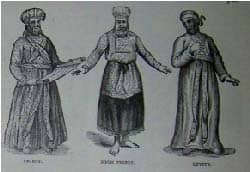Next the parsha goes into instructions to the Levites about how to help Aaron and his priests. This is an interesting assignment. Remember back when we were in Egypt? When G-d killed the firstborn Egyptian males, G-d also consecrated the firstborn Jewish males. That consecration from G-d generally would have meant that they would be the helpers to the priests. If you look back to medieval Europe, according to primogeniture the firstborn male was the heir but subsequent children had traditional roles too. You tried for an heir, a spare, and if you had a third son, he generally went into the clergy. What is interesting with the way G-d lays it out is that the community and the Tabernacle came before securing your own land rights and heir.
Anyway, back to the parsha. Here G-d surprises the Israelites by selecting the tribe of Levi as the priestly helpers and not the firstborns. Why? Well, the firstborn males are being punished for participating in the Golden Calf "incident." G-d forgives, but G-d doesn't forget.
The Levities are divided into three sub-tribes: Gershon, Kohath, and Merari, who were the sons of Levi. They, along with the priests, camp directly around the Tabernacle to protect it. Every Levite from the age of one month and up is counted in the census and factored into their tribal role. As for the Priests, the Kohens, Moses and Aaron are told by G-d to count the Kohanim who were between 35 and 50 years old (that is, only the ones who could perform the proscribed tasks in the Tabernacle).
 This parsha is more than just counting and sleeping assignments. This is the turning point when the Israelites realize that they aren't slaves anymore but they aren't really sure who they are or what they are supposed to do. I imagine this is the same feeling that was felt in the U.S. when the African-American slaves were freed from their bondage. They sometimes took the names of their slave owners and even stayed on the same land and worked it next to the people who owned them. They were still being defined by the oppression they had suffered. I think the Jews went through this same process, only a few thousand years before. They had to leave their homes and the comfort of the routine because otherwise they would have been killed. But now they are wandering, physically but also emotionally, in the desert of uncertainty.
This parsha is more than just counting and sleeping assignments. This is the turning point when the Israelites realize that they aren't slaves anymore but they aren't really sure who they are or what they are supposed to do. I imagine this is the same feeling that was felt in the U.S. when the African-American slaves were freed from their bondage. They sometimes took the names of their slave owners and even stayed on the same land and worked it next to the people who owned them. They were still being defined by the oppression they had suffered. I think the Jews went through this same process, only a few thousand years before. They had to leave their homes and the comfort of the routine because otherwise they would have been killed. But now they are wandering, physically but also emotionally, in the desert of uncertainty.
It is really hard to make the decision to leave a bad situation when it is comfortable, but often it is the right choice. The routine may be comforting but Hashem has bigger and better things in store for us. So count your kids and make sure they are all there, remind them that they can be anything they want to be, and head on out!
Parshat Bemidbar from G-dcast.com
More Torah cartoons at www.g-dcast.com
Talia Davis is the daughter, granddaughter, and great-granddaughter of rabbis. She directs the Jewish Portal at Patheos and manages the site's online community.





